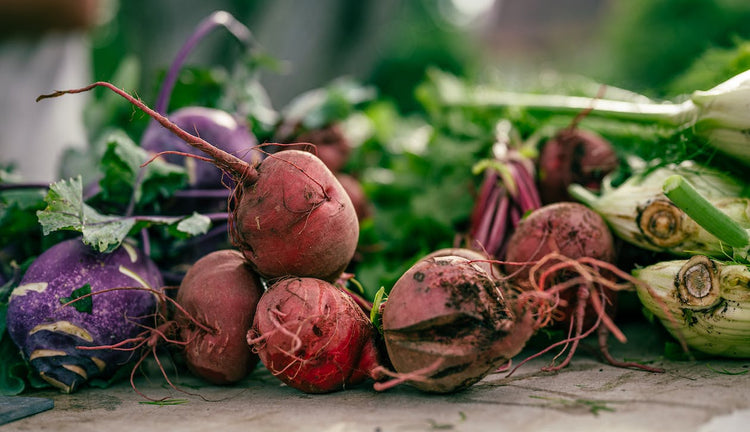Beetroot is a root vegetable, known for its earthy taste and aroma.
In addition to giving your plate a pop of color, beets are nutritious and packed with essential vitamins, minerals, and plant compounds, many of which have healing properties.
What's more, they're delicious and easy to add to your diet in dishes like balsamic roasted beets, appetizers, chips and salads, and more.
Here are 9 benefits of beets:
1. MULTIPLE NUTRITIONAL AND LOW calorie

Beets are low in calories but packed with valuable vitamins and minerals. In fact, they contain nearly all the vitamins and minerals your body needs.
Here is an overview of the nutrients present in a 100g boiled beetroot:
- Calories: 44
- Protein: 1.7 grams
- Fat: 0.2 grams
- Starch: 10 grams
- Fiber: 2 grams
- Folate: 20% of the Daily Value (DV)
- Manganese: 14% DV
- Dong: 8% DV
- Potassium: 7% DV
- Magnesium: 6% DV
- Vitamin C: 4% DV
- Vitamin B6: 4% DV
- Iron: 4% DV
Beets are particularly rich in folate, a vitamin that plays a key role in growth, development and heart health.
They also contain a good amount of manganese, which is involved in bone formation, nutrient metabolism, brain function, etc.
Plus, they're high in copper, an important mineral needed for energy production and the synthesis of certain neurotransmitters.
2. CAN HELP CONTROL YOUR BLOOD PRESSURE
Beets have been well studied for their ability to reduce high blood pressure levels, which is a major risk factor for heart disease.
These blood pressure lowering effects may be due to the high nitrate concentration in beets.
In your body, dietary nitrates are converted to nitric oxide, a molecule that dilates blood vessels and lowers blood pressure.
Beets are also an excellent source of folate. Although research has produced mixed results, increasing folate intake can significantly lower blood pressure levels.
However, keep in mind that the effects of beets on blood pressure are only temporary. Therefore, you need to consume them regularly to experience the benefits in the long run.
3. IMPROVE SPORTS PERFORMANCE
Some studies suggest that dietary nitrates such as those found in beets can enhance athletic performance.
Nitrates seem to affect physical performance by improving the efficiency of mitochondria (mitochondria responsible for energy production in your cells).
According to one review, beetroot juice can boost endurance, enhance cardiovascular and respiratory performance, and improve performance for athletes.
Additionally, beetroot juice has also been shown to improve cycling performance and increase oxygen use by up to 20%.
It is important to note that blood nitrate levels peak within 2–3 hours after eating beets or their juice. Therefore, it is best to consume them a few hours before training or competition to maximize their potential benefits.
4. HELP AGAINST INFECTIONS
Beets contain a pigment called betalain, which has some anti-inflammatory properties.
This can benefit several aspects of health, as chronic inflammation is linked to conditions like obesity, heart disease, liver disease and cancer.
One study in 24 people with high blood pressure found that consuming 250 ml of beetroot juice for 2 weeks significantly reduced several markers of inflammation, including C-reactive protein (CRP) and tumor necrosis factor. (TNF-a).
Additionally, an older 2014 study in people with osteoarthritis found that betalain capsules made with beetroot extract helped reduce pain and discomfort.
Beetroot juice and extract have also been shown to reduce kidney inflammation in rats injected with the toxic, injury-causing chemical.
However, more research in humans is still needed to determine if enjoying beets in normal amounts as part of a healthy diet can provide the same anti-inflammatory benefits.
5. IMPROVES DIGITAL HEALTH

Beets can promote digestive health, prevent constipation, inflammatory bowel disease (IBS) and diverticulitis.
What's more, fiber reduces the risk of chronic diseases, including colon cancer, heart disease, and type 2 diabetes.
6. SUPPORTING BRAIN HEALTH
Over time, mental and cognitive functions naturally decline, which can increase the risk of neurodegenerative disorders such as dementia.
The nitrates in beets can improve brain function by promoting the dilation of blood vessels and increasing blood flow to the brain.
7. ANTI-CANCER
Beets contain several compounds with anti-cancer properties, including betaine, ferulic acid, rutin, kaempferol, and caffeic acid.
Many studies have shown that beetroot extract can slow down the division and growth of cancer cells.
Several other studies have found that having higher blood levels of betaine may reduce the risk of developing cancer.
8. ENERGY BALANCE
Beets have a number of nutritional properties that make them a great addition to a balanced diet.
First, they're low in fat and calories but high in water, which can help balance your energy intake.
Increasing your intake of low-calorie foods like these vegetables will also help you lose weight.
Furthermore, despite being low in calories, they contain a moderate amount of protein and fiber. Both of these nutrients can help you achieve and maintain your desired weight.
The fiber in beets can also improve digestive health, reduce cravings and create a feeling of fullness, which in turn lowers your overall calorie intake.
Plus, by including them in smoothies or other recipes, you can easily increase your fruit and vegetable intake to improve the quality of your diet.
9. EASY TO EAT

Beets are not only nutritious, but they are also incredibly tasty and easy to incorporate into your diet.
You can juice, bake, steam or soak them. Alternatively, you can even eat them raw, thinly sliced or grated.
Here are some delicious and fun ways to add more beets to your diet:
- Lettuce: Crushed beetroot adds flavor and color to coleslaw or other salads.
- Dipping: Beets mixed with Greek yogurt and fresh garlic make a delicious, healthy, and colorful dip.
- Juice: Fresh beetroot juice is often better than the store-bought variety, which can be high in added sugars and contains only small amounts of beets.
- You can cook and enjoy fresh beetroot leaves the same way you would use spinach.
- Bake: Season with beets and toss with a little olive oil, salt, pepper, and herbs or spices of your choice. Then, bake them in a 400°F (205°C) oven for 15–20 minutes until they're tender.



